UNIT 6 Ученик Аракин В.Д. Книга 1 1
реклама
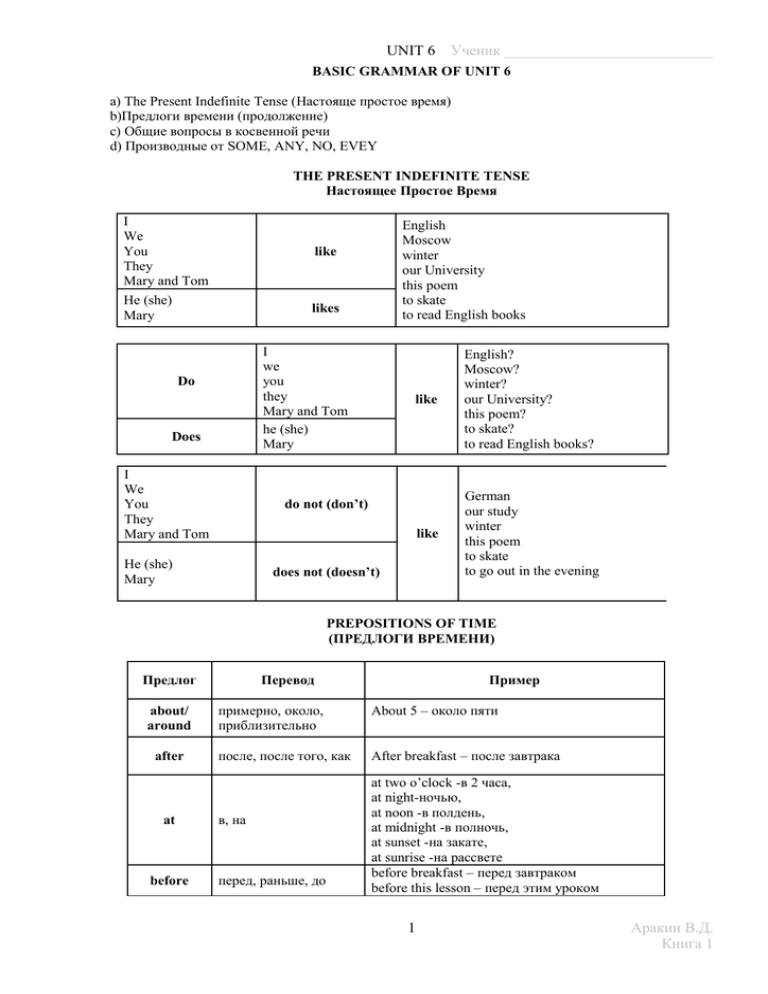
UNIT 6 Ученик ___________________________ BASIC GRAMMAR OF UNIT 6 a) The Present Indefinite Tense (Настояще простое время) b)Предлоги времени (продолжение) c) Общие вопросы в косвенной речи d) Производные от SOME, ANY, NO, EVEY THE PRESENT INDEFINITE TENSE Настоящее Простое Время I We You They Mary and Tom He (she) Mary English Moscow winter our University this poem to skate to read English books like likes I we you they Mary and Tom he (she) Mary Do Does I We You They Mary and Tom like English? Moscow? winter? our University? this poem? to skate? to read English books? like German our study winter this poem to skate to go out in the evening do not (don’t) He (she) Mary does not (doesn’t) PREPOSITIONS OF TIME (ПРЕДЛОГИ ВРЕМЕНИ) Предлог about/ around after at before Перевод Пример примерно, около, приблизительно About 5 – около пяти после, после того, как After breakfast – после завтрака в, на перед, раньше, до at two o’clock -в 2 часа, at night-ночью, at noon -в полдень, at midnight -в полночь, at sunset -на закате, at sunrise -на рассвете before breakfast – перед завтраком before this lesson – перед этим уроком 1 Аракин В.Д. Книга 1 UNIT 6 by during from...till... Ученик ___________________________ к; до; не позже, чем by noon – к полудню by Friday – до пятницы во время, в течение, в during our holidays – во время наших каникул от...до...; с...до... from morning till night – с утра до ночи in в, через, за (какое-то время) on на, в, по, во время in January – в январе in spring - весной in 1949- в 1949 in the evening - вечером in a day — через день in 10 days — за 10 дней on Sunday — в воскресенье on May the first – в мае первого числа on the 2nd of June — второго июня on a trip – во время поездки since с; начиная с; since morning – с утра until до until Monday – до понедельника Запомните следующие обстоятельства времени, которые употребляются без предлога: this morning, this afternoon, this evening, tonight yesterday morning, yesterday afternoon, yesterday evening, last night tomorrow morning, tomorrow afternoon, tomorrow evening, tomorrow night GENERAL QUESTIONS IN INDERECT SPEECH (ОБЩИЕ ВОПРОСЫ В КОСВЕННОЙ РЕЧИ) Прямая речь Косвенная речь I ask: “Is the book interesting?” I ask if (whether) the book is interesting. Я спрашиваю, интересная ли книжка. He asks: “Does Mary like summer?” He asks if (whether) Mary likes summer. Он спрашивает, нравится ли Марии лето. ПРОИЗВОДНЫЕ ОТ SOME, ANY, NO, EVERY -THING -BODY SOME something – что-то, что-нибудь somebody – кто-то, кто-нибудь ANY anything – что-то, что-нибудь anybody – кто-то, кто-нибудь NO nothing – ничто, ничего nobody – никто, никого EVERY everything - всё everybody - все 2 Аракин В.Д. Книга 1 UNIT 6 Ученик ___________________________ TEXT MR. WHITE COMES AGAIN It is Saturday afternoon. Doctor Sandford is in his study. Betty knocks. “Come in, please. What is it, Betty?” “Mr. White wants to see you, Henry”. “Well, yes. Show him in please.” (Mr. White enters) “Good afternoon, doctor”. “Good afternoon, Mr. White”. “I’m terribly sorry to trouble you”. “That’s all right. Glad to see you. Sit down, please. What can I do for you?” “Do you receive the Times?” “Certainly” “Would you like to have it for the next year?” “Oh, I forget. We never remember such things in time. Must I pay anything right now?” “No, you needn’t. For the present, you can sign this paper. Here you are”. “Where do I sign?” “Here, please. Thank you, doctor”. “Well, Mr. White. It’s five o’clock. You’ll have some tea with us, won’t you?” “Thank you. I’d be glad to”. “Let’s go to the dining-room. This way, please”. VOCABULARY NOTES to knock –стучать what is it? – в чем дело? Show him in – просите его сюда (проведите) to enter – входить I am terribly sorry – я ужасно сожалею terrible - ужасный to trouble – беспокоить What can I do for you? – Чем могу быть вам полезен? to receive – получать certainly – конечно would you like – не хотелось бы вам… to remember – помнить, вспоминать such things – такие вещи in time – вовремя to pay – платить, оплачивать right now – сразу же, тотчас же for the present – пока, на этот раз to sign – подписывать where do I sign? – где мне подписаться? Here you are – вот, пожалуйста Существует несколько эквивалентов русского слова «пожалуйста» 1. Please – употребляется, когда мы просим чего-либо или спрашиваем о чем-то – Please, can you give me your book? 2. Here you are – употребляется в ответе на какую-либо просьбу – Please give me your pen – Here you are. 3. not at all – не стоит благодарности, пожалуйста. Употребляется в ответе на чью-то благодарность. – Thank you for your help – Not at all. You will have some tea with us, won’t you? – не выпьете ли вы с нами чаю? I’d be glad to (I would be glad to) – с радостью, с удовольствием This way, please – сюда, пожалуйста 3 Аракин В.Д. Книга 1 UNIT 6 Ученик ___________________________ TOPICAL VOCABULARY Months: January, February, March, April, May, June, July, August, September, October, November, December Days of the week: Sunday, Monday, Tuesday, Wednesday, Thursday, Friday, Saturday What date is it today? – Today is the seventeenth of March What day is it today? – Today is Monday. CONVERSATIONAL PHRASES Thanks Thank you – Спасибо Thank you very (so) much. Thank you a lot – Спасибо большое Thanks. - Спасибо (менее формально) Thank you for coming – Спасибо, что пришли That is (was) very kind of you – Это очень мило с вашей стороны. Вы очень любезны. Replies for thanks You are welcome – Пожалуйста. Не стоит благодарности Don't mention it. - Не за что. Не стоит благодарности. Not at all — Не за что No trouble at all — Да чтовы, какое это беспокойство. That was a pleasure. - Мне было приятно (это сделать) Questioning I wonder if you could help me – не могли бы вы мне помочь I would like to know (where I could get this book) – мне бы хотелось знать I wonder if you could tell me – не могли бы вы мне сказать Do you happen to know (when the train is coming) – вы случайно не знаете Answering Well, let me see – дайте-ка подумаю, посмотрим Oh, let me think for a moment – позвольте мне подумать I am not sure – я не уверен Let me find out – позвольте мне выяснить I am glad you asked me that – рад, что вы задали мне этот вопрос That’s a very good question – это хороший вопрос I am terribly sorry, I really don’t know – я ужасно сожалею, я действительно не знаю I have no idea, I am afraid – боюсь, что я этого не знаю TASK Exercise 1 Answer the following questions: A. 1. Where is Mr. Sandford on a Saturday afternoon? 2. Who comes to see Doctor Sandford on a Saturday afternoon? 3. What does Mr. White ask Doctor Sandford about? 4. Why does Mr. White call on Doctor Sandford? 5. Docotr Sandford sins the paper, doesn’t he? 6. What do they do in England at 5 o’clock in the afternoon? B. 1. Do you like English? 2. You speak English well, don’t you? 3. Where do you study English? 4. Does your brother go to the Institute every day? 5. Your classes begin in the morning, don’t they? 6. Where do you prepare your lessons? 7. What does your brother do in the evening? 8. What foreign language does your mother speak? 9. What do you write on the black-board with? C. 1. What’s the date today? 2. What day is it? 3. What is the first day of the week? 4. What is the fifth month of the year? 5. Which month is November? 6. Which month is June? 7. Which month is December? 8. When do your studies begin? 4 Аракин В.Д. Книга 1 UNIT 6 Ученик ___________________________ Exercise 2 Make the following sentences interrogative and negative Model: Mr. White wants to see you Does Mr. White want to see me? No, he doesn’t. 1. Mr. White and Betty enter the room. 2. Mr. White wants to see Doctor Sandford. 3. You can sign this paper. 4. I know some of these names. 5. I can do something. 6. The walls of my room are light-green. Exercise 3 Write questions to the words in bold type 1. There are twelve months in a year. 2. There are thirty days in June. 3. She is twelve. 4. My brother’s friend can skate well. 5. He is a doctor. 6. We call it a bedroom. 7. I like to read English books. 8. It is the first of October. 9. It is Thursday. Exercise 4 Fill in somebody (someone), anybody (anyone), nobody (no one), everybody (everyone), something, anything, nothing, everything 1. Is there ________________ on the desk? 2. The door is open. There must be _______________ at home. 3. There is _________________ wrong with my fountain-pen. It won’t write. 4. A blind man cannot see ________________. 5. Is there _______________ in the room? – Yes, there is __________________ in it. 6. It is too dark here, I can’t see _______________. 7. If there is ____________________ in the room you may turn off the light. 8. We must do _______________ to help her. 9. Can I do ___________________ for you? 10. There must be _______________ interesting in the book you read. 11. It is too dark, I can’t see _________________ on the blackboard. May I turn on the light? 12. We can work in Room No.20. There is _____________ there. 13. Let’s go there at once. I want to see ___________________ with my own eyes. 14. May I come to see you tonight? I’ve got _________________ to tell you. 15. Bob is one of our best students, __________________ knows him. 16. Must we learn __________________ by heart? – No, you needn’t 17. There is ______________ interesting in this magazine. 18. Is _______________ away from the lesson? Exercise 5 Fill in prepositions if necessary: 1. He must go to St. Petersburg ……spring. 2. We take our written exams ….. January. 3. Our studies begin ….autumn. 4. What do you do ….Sunday? 5. All the students of our group will take part in the concert …. eighth ….May. 6. May I ring you up …. the morning? 7. My elder brother is a doctor. He often comes ……home late …..night. 8. I must go and see him ….three o’clock ….Friday. 9. Listen …the new text …the laboratory. 10. Look ….the blackboard. Do you see any mistakes ….it? 11. Who is …duty today? 12. Will you go …the blackboard? 13. You may go …your place. Exercise 6 Fill in the definite or indefinite article if necessary: 1. There are three rooms and …kitchen in her new flat. 2. My new dress is made of …silk. 3. If you want to write something on …blackboard, you must have …piece of …chalk. 4. Are there any students in … Room No.12? 5. I have …new English book. …book is very interesting. 6. There is …garden and … lawn in front of her Institute. …garden is not large, but it is very beautiful. 7. The students of your group must be in …Room No.30. 8. Open …book at page 29 and start reading. 9. May is …fifth month of the year. 10. Saturday is … sixth day of the week. 11. Sunday is … day off. 5 Аракин В.Д. Книга 1 UNIT 6 Ученик ___________________________ Exercise 7 Make the following questions in indirect speech: Model: The teacher asks: ”Do you know any English words?” The teacher asks if we know any English words. Tom asks: Do you know English well?” 1. She asks: “Do you like to skate?” 2. My friends ask: “Are you free on Sunday?” 3. The student asks: “Have you any English books at home?” 4. She asks: “Do you want to read this book?” 5. The teacher asks: “Are there any mistakes in spelling on the blackboard?” 6. The student asks: “Are there any mistakes in my pronunciation?” 7. The teacher asks me: “Do you know any poem by heart?” 8. Mary asks me: “Do you know many English words? 9. Betty asks Tom: “Must you go to the Institute today?” 10. The teacher asks the boy: “Is May a spring month?” 11. The students ask me: “Do you like our University?” 12. Mr. White asks Betty: “Is Doctor Sandford in?” 13. The children ask Betty: “Do you play the piano?” Exercise 8 Translate the following into English 1.Пока я ничего не могу сделать. 2. Никто ничего не хочет есть. 3. Могу ли я для вас что-либо сделать? 4. Можно прийти к вам в воскресенье? 5. Четверг – пятый день недели. 6. Моей младшей сестре сейчас десять лет. 7. Я пока не могу говорить по-английски. - Неужели? 8. Что значит это слово? 9. Должна ли я что-либо подписать? – Вот, пожалуйста. – Где мне подписать? – Вот здесь. 10. Вы умеете играть на пианино? 11. Можете ли вы дать мне что-нибудь почитать? 12. Кто работает в комнате №4? 13. Откройте страницу пять и прочитайте текст. 14. На девятой странице нет никакой картинки. 15. В комнате ваших родителей есть кто-нибудь? 16. Мой сын знает наизусть много английских стихов – Неужели? 17. Его дочь уже школьница – Неужели? 18. Я могу вам дать эту книгу. – Неужели? 19. Аня должна приехать в понедельник – Неужели? 20. Никто в нашей семье не работает в субботу. 6 Аракин В.Д. Книга 1
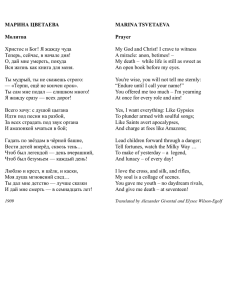
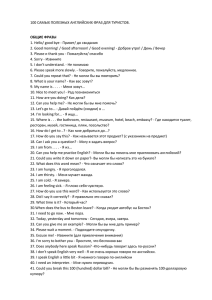
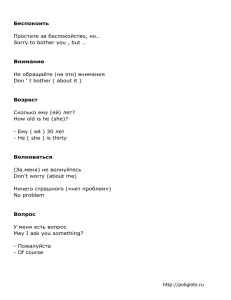
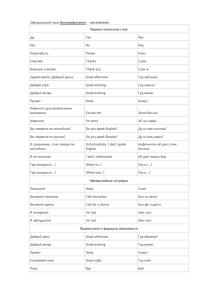

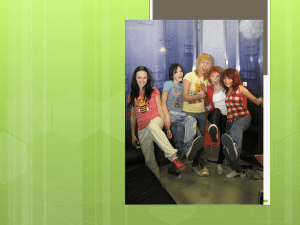
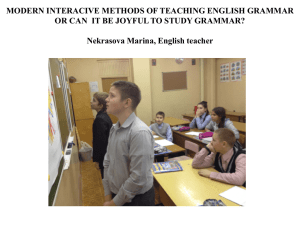
![Гъэтхапэ [Ğetxape]](http://s1.studylib.ru/store/data/004084788_1-232b607c0c5bea7c074e6186249e877c-300x300.png)